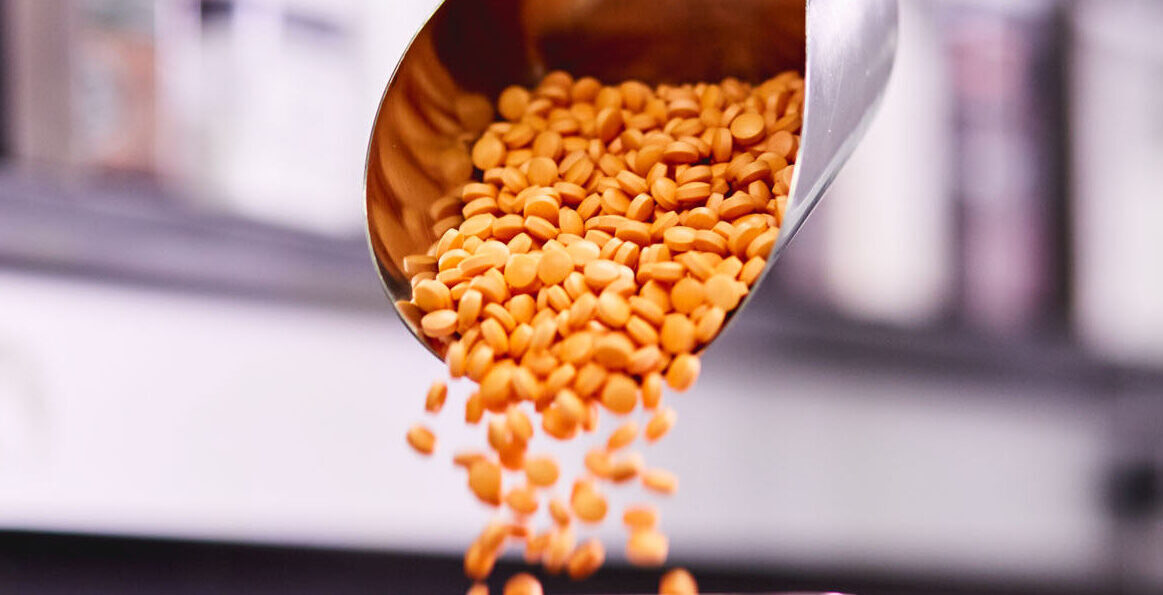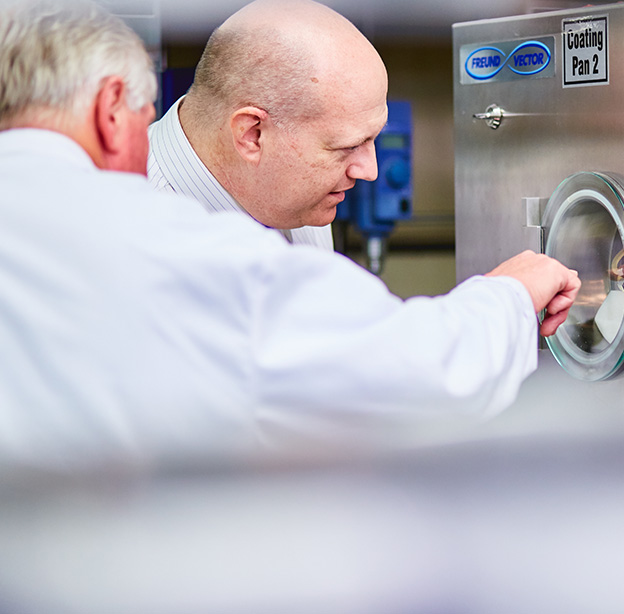Trends and Insights
Why Use a Tablet Coating
What is a coated tablet?
Tablet coatings are a critical component in the pharmaceutical and nutraceutical industries. They are applied to tablets to enhance their appearance, protect them from external factors, and improve their overall performance. Coating solutions for tablets can be made from various materials and offer a range of benefits.
Advantages of Coated Tablets over Uncoated Tablets
When selecting the right tablet formulation for your medication, coated tablets offer several advantages over uncoated tablets:
- Protective Properties: Tablet coatings act as a shield, preventing the tablet from being damaged by moisture, and or light. This is especially beneficial for light sensitive or moisture-sensitive drugs, as it helps maintain their stability and prolong their shelf life.
- Improved Taste and Appearance: Coating tablets can help mask unpleasant taste or odor associated with the medication, making it more palatable for patients. Additionally, coatings can give tablets a glossy or matte finish, making them visually appealing and easier to identify. This is particularly important for branded and generic coated tablets, as it helps differentiate them in the market.
- Enhanced Stability and Shelf Life: Coating tablets provide an additional layer of protection, shielding them from external factors such as moisture, light, and air. This helps extend their shelf life and maintain the potency of the active ingredients, ensuring patients receive the full intended therapeutic benefits. (3)
- Easier Swallowing and Reduced Irritation: The smooth and slippery surface of coated tablets makes them easier to swallow, particularly for those who may have difficulty swallowing larger or uncoated tablets. Additionally, the coating can help reduce the potential for irritation to the throat and gastrointestinal tract.
- Improved Drug Delivery: Coated tablets can be formulated to have controlled release properties, allowing for a slower and more consistent release of the medication into the body. This can be beneficial for drugs that require a specific release pattern or need to be absorbed slowly over time.
Overall, coated tablets provide numerous advantages that enhance the effectiveness and patient experience of medication. By protecting the tablets, improving taste and appearance, extending shelf life, easing swallowing, and optimizing drug delivery, coated tablets offer a comprehensive solution for pharmaceutical and nutraceutical industries.
"Film coating is the most effective and commonly used approach for taste masking and is particularly suitable for microencapsulation of small particles to form taste masked multi-unit dosage forms" (4)
Types of Tablet Coatings
When it comes to coatings, several techniques can be employed to enhance the appearance, stability and functionality of tablets. At Sensient Pharma, we offer a range of high-quality coating solutions for tablets that cater to the diverse needs of the pharmaceutical and nutraceutical industry.
- Film coating is a highly advanced and effective method of coating tablets. By applying a thin polymer film to the tablet surface, film-coated tablets offer enhanced protection, increased durability, and improved drug release properties. In addition to these benefits, film coating also allows for the inclusion of colorants and other functional ingredients, making it possible to meet specific requirements for appearance and functionality. This innovative technique has revolutionized the pharmaceutical industry, providing a more efficient and customizable solution for tablet coating. With its ability to enhance the overall quality and performance of tablets, film coating has become a preferred choice for pharmaceutical manufacturers worldwide.

- Enteric coatings are an essential pharmaceutical technology that plays a crucial role in protecting tablets from the harsh acidic environment of the stomach. By ensuring drug release in the intestines, enteric coatings enhance the efficacy of tablets that are sensitive to gastric acids or require delayed release. This technique not only safeguards the integrity of the medication but also allows for targeted drug delivery. Moreover, the use of enteric-coated tablets has shown to improve patient compliance by reducing the occurrence of gastrointestinal side effects commonly associated with certain medications. The advancements in enteric coating technology have revolutionized the field of pharmaceuticals, enabling the development of more effective and patient-friendly drug formulations.

Importance of High-Quality Tablet Coatings
When it comes to tablet manufacturing, high-quality coating is of utmost importance. Not only does it enhance the appearance of the tablets, but plays a crucial role in ensuring the effectiveness and safety. Let us explore some key reasons why investing in high-quality tablet coating solutions is essential.
- Ensuring Uniform Coating Thickness: A uniform coating thickness is vital for tablets as it ensures consistent drug release and absorption. With high-quality coating solutions, you can achieve precise control over the thickness of the coating layer, minimizing variations that may affect the tablet’s performance.
- Preventing Cross-contamination: In the pharmaceutical industry, cross-contamination is a significant concern. Coating solutions that adhere firmly to the tablets create a protective barrier, preventing the transfer of active ingredients between different tablets. This helps maintain the purity and integrity of each tablet, reducing the risk of adverse reactions or ineffective treatments.
- Maintaining Product Integrity: Tablets can be exposed to various environmental factors, such as moisture, light, and heat, which can degrade their quality over time. High-quality tablet coatings act as a shield, safeguarding the tablets from these external elements. It helps maintain the stability and potency of the active ingredients, ensuring that the tablets remain effective throughout their shelf life.
- Enhancing Patient Compliance: Another crucial aspect of high-quality tablet coatings is their impact on patient compliance. Tablets with appealing appearance and smooth coating are more likely to be taken by patients as prescribed. This can lead to better treatment outcomes and improved patient satisfaction. Investing in high-quality tablet coatings not only benefits the pharmaceutical manufacturer but also contributes to the overall patient experience.
Conclusion
Are you in search of the best coating solutions for tablets? At Sensient Pharma, we specialize in delivering high-quality tablet coating solutions tailored to the unique needs of pharmaceutical and nutraceutical companies. Tablet coatings is essential for protecting active ingredients, enhancing stability and improving the overall appearance of coated tablets.
When it comes to pharmaceutical coating, trust the experts at Sensient Pharma for innovative and reliable solutions. Contact us today to learn more about our coating solutions for tablets and how they can benefit your pharmaceutical products.
Let's Get Started!
Requesting a consult with Sensient's excipient experts is easy and our team is glad to assist!



